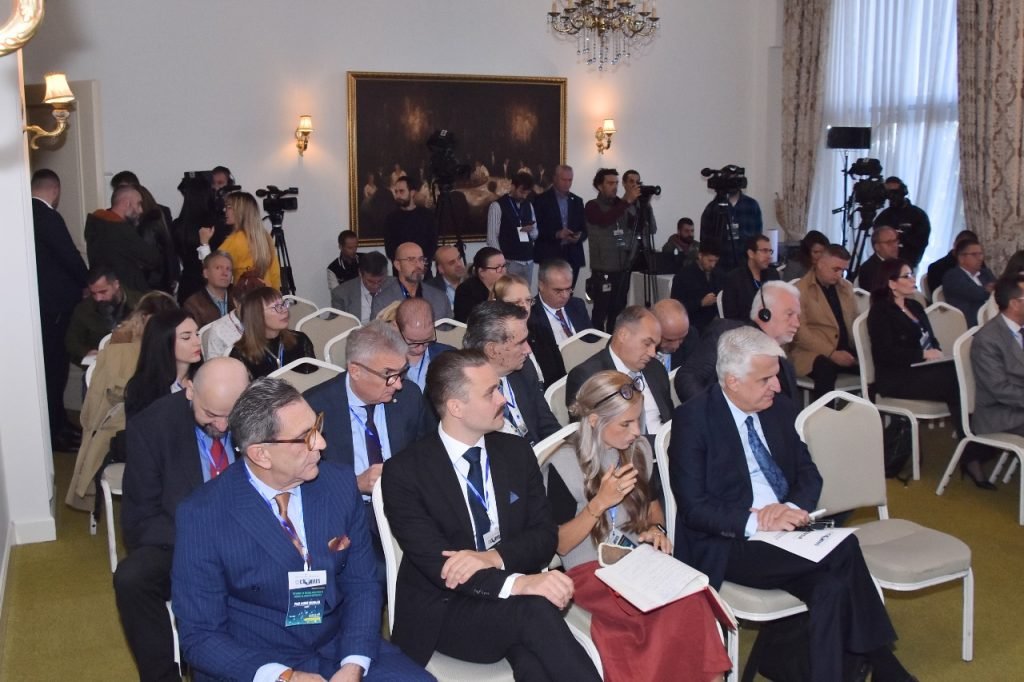- Phd. Cand. Agim Musliu
Director at Institute for Hybrid Warfare Studies “OCTOPUS”
agim.musliu@octopusinstitute.org - Dr. Gurakuç Kuçi
Senior Researcher at Institute for Hybrid Warfare Studies “OCTOPUS”
gurakuq.kuqi@octopusinstitute.org
Introduction:
The Institute for Hybrid Warfare Studies “OCTOPUS” in Pristina organized an international conference on October 2, 2024, titled “The Impact of Russian Aggression in Ukraine on European Geopolitics.” The event featured prominent experts, diplomats, politicians, and scholars from the region, as well as internationally recognized figures, including Dr. Jennifer Cassidy from Oxford, Dr. Pekka Kallioniemi from Finland, Ukrainian Professor Dr. Ihor Todorov, among others.
Discussions focused on the consequences of the conflict for security and international relations, offering a platform for dialogue and deep analysis of the impacts of Russian aggression, the challenges, and opportunities for Europe in this difficult context.
Following the Russian aggression in Ukraine, Europe has experienced significant changes, including an increased sense of danger and a reevaluation of security strategies. One major consequence has been the intensification of cooperation among European countries in defense and energy, as well as a deepening of relationships with NATO.
The challenges facing Europe today are manifold. One significant issue is energy: European countries are striving to reduce dependence on Russian resources and to find sustainable alternatives. Additionally, Europe is grappling with a refugee crisis and the social tensions that often accompany migration.
In the Balkans, the situation is complicated. Some countries, including Kosovo, Bosnia, and Montenegro, face threats from Serbia, which, like Russia, employs historical narratives to justify territorial claims. These historical reminiscences pose a risk to the region’s stability, inciting ethnic and political tensions.
Serbia appears to be employing strategies similar to those of Russia, challenging the order of stability in the Balkans and undermining efforts for European integration of other countries. This makes the situation even more fragile, heightening fears of a possible escalation of conflict. The “Russian world” and the “Serbian world” seem to represent a shared threat to both Europe and the Balkans today.
In this context, the conference emphasized the importance of Europe strengthening its engagement in the region by supporting democracy and stability in the Balkans to prevent the resurgence of tensions that could jeopardize peace and security across the continent.
The stability of the Balkans and Europe was particularly emphasized in the address by the President of the Assembly of Kosovo, Glauk Konjufca.
Konjufca: Russia has not given up on the “Russian world” nor Serbia on the “Serbian world”
In his address to attendees, Konjufca stated that the consequences of Russian aggression in Ukraine have affected the European continent—its peace, stability, security, politics, and geopolitics—more than any other conflict since World War II.
He noted that the war in Ukraine represents a decisive battle for the democratic order in Europe.

“The President of the Assembly said that due to the lack of a resolute response in 2014 to the Russian invasion of Crimea and the treating of Russia as a despotic partner with which one could cooperate economically, mistakenly assuming that Putin’s pan-Russian ambitions were limited, Europe today is facing a war that concerns not only the fate of Ukraine as a sovereign state and the dignity of Ukrainians as a nation but also a decisive battle for the democratic order in Europe, established after the fall of the ‘Iron Curtain’ in 1989.”
He further stressed that Russia has not abandoned the “Russian world,” nor has Serbia abandoned the “Serbian world.”
Konjufca referred to the recent attack in Banjska as “an identical replica of Russia’s aggressive behavior towards Ukraine.”
“In our regional and Balkan context, the Russian invasion of Ukraine marks the first act of a strategy of destabilization in Europe, where the Balkans, with Serbia as an extension of Russia, would represent the second act of this strategy. Both Russia and Serbia have not given up on this strategy, as neither has given up on their respective ‘worlds.’ The terrorist attack on Kosovo in Banjska last September was an identical replica of Russia’s aggressive behavior toward Ukraine. Serbian paramilitary units, trained by the Serbian army and equipped with military arsenals from the Serbian Ministry of Defense, aimed to annex the north, during which an officer of the Kosovo Police, now a hero, Afrim Bunjaku, was killed in defense of sovereignty, integrity, and security of the Republic of Kosovo,” said Konjufca.
He continued, “The dualism is a well-known weapon of Serbia on the international stage to realize its interests, but it is equally known that Serbia has never been a bastion where the West was defended, as after every war Serbia has always aligned with the East. Thus, in this war in Ukraine in defense of its sovereignty, Serbia is not an ally, but merely benefits by doing business and selling its weapons.”
“Attempts to destabilize Bosnia through Dodik, who promotes every day the secession of the Republic of Srpska and its unification with the ‘Serbian world,’ the refusal to normalize relations with Kosovo through factual recognition that frames the Brussels Agreement, and the attempt to change the Euro-Atlantic orientation of Montenegro are concrete traces of a policy aimed at undermining any progress that the Euro-Western investment has made in our region,” Konjufca concluded.
The conference then continued with a special lecture with the Professor from the University of Oxford, Dr. Jennifer Cassidy.
Special Lecturer: Dr. Jennifer Cassidy – Oxford University
Oxford Scholar Warns of Potential Serbian Invasion of Kosovo
Dr. Jennifer Cassidy, a prominent academic from the University of Oxford, has expressed serious concerns regarding the potential for a Serbian invasion of Kosovo, warning that the threat cannot be underestimated. Speaking at a recent conference hosted by the Institute for Hybrid Warfare Studies “OCTOPUS”, Cassidy underscored the risks posed by Serbia’s close relationship with Russia, suggesting that this alliance heightens the chances of aggression in the Balkans.

“In both my personal and professional capacity, I believe it would be naïve to dismiss the possibility of Serbian intervention in Kosovo,” Cassidy remarked. “Serbia’s deep ties with Russia, coupled with the broader geopolitical landscape, present a very real threat of invasion—whether through covert military operations or direct annexation efforts. We must remain vigilant.”
Cassidy emphasized that the regional security environment, already strained by the ongoing war in Ukraine, has created a dangerous context for smaller nations like Kosovo. She argued that, as international attention shifts to conflicts elsewhere, the Balkans could be left vulnerable to destabilizing actions. Serbia, emboldened by its alliance with Russia, could exploit such distractions to pursue territorial ambitions in Kosovo.
A key point in Cassidy’s address was the vital importance of strengthening Kosovo’s ties with the European Union (EU). She advocated for increased cooperation between Kosovo and other Western Balkan nations as a critical strategy for ensuring long-term security and preventing external threats. Cassidy warned that any weakening of these relationships could leave Kosovo exposed to greater risks.
“It is imperative for Kosovo, as well as other nations in the Western Balkans, to deepen their alliances with the EU. The closer these ties, the stronger the region’s ability to resist external pressures from actors like Serbia and Russia,” Cassidy asserted. “The EU must also be consistent in its messaging and policies, as mixed signals from Brussels can lead to confusion and instability.”
During the conference, Cassidy was critical of the European Union’s inconsistent approach toward Kosovo, particularly regarding its accession process. She noted that while Kosovo has met many of the requirements set out by the EU, it still faces significant barriers due to opposition from some member states.
“The EU’s failure to present a unified stance on Kosovo’s membership is problematic. While Kosovo has shown a clear desire and commitment to integrate with Europe, certain EU countries continue to block its progress, sending confusing signals to both the region and the international community,” Cassidy explained. “This inconsistency undermines Kosovo’s efforts and weakens the EU’s overall influence in the Balkans.”
Cassidy further elaborated on the potential consequences of a Russian victory in Ukraine for the stability of the Balkans. She warned that a successful Russian campaign in Ukraine could embolden Serbia to pursue its own territorial objectives in the region, drawing dangerous parallels between the two conflicts.
“If Russia achieves its goals in Ukraine, we could see Serbia following a similar playbook in the Balkans,” Cassidy warned. “Serbia has long harbored ambitions toward Kosovo, and a Russian victory would only serve to embolden these aspirations. This could lead to a significant escalation in tensions and even military conflict.”
Cassidy concluded her address by calling for greater diplomatic efforts and regional cooperation to prevent conflict and ensure peace in the Balkans. She pointed to the need for third-party mediation, akin to the Good Friday Agreement in Northern Ireland, as a potential model for resolving longstanding tensions between Kosovo and Serbia.
“The only way forward is through diplomacy and mutual understanding,” Cassidy noted. “The Balkans has seen far too much conflict. Now is the time for constructive dialogue, not aggression. The international community, especially the EU, must play a central role in facilitating this dialogue and ensuring that peace is maintained.”
Professor Cassidy was also part of the third panel at the conference, where she also discussed The Future of Diplomacy: Technology, Strategic Narratives and the Role of Silicon Valley.
She in this panel discussed the role of diplomacy in addressing current geopolitical challenges, particularly focusing on the Western Balkans and broader global issues. Her speech examined the limitations of modern diplomacy and the impact of strategic narratives, technology, and foreign influence on international relations.
Dr. Cassidy opened by reflecting on the current state of diplomacy, which she described as being on “life support.” She highlighted the failure of international organizations such as the UN Security Council to enforce critical judgments or hold actors accountable, which has led to a sense of diplomatic paralysis.
Dr. Cassidy emphasized how strategic narratives and digital diplomacy have evolved, using the annexation of Crimea in 2014 and the Russian invasion of Ukraine as case studies. She contrasted the lack of coordinated digital strategy during Crimea’s annexation with the more unified response during Russia’s 2022 invasion of Ukraine.
She also touched on the growing influence of artificial intelligence (AI) and deepfake technology in diplomacy. Cassidy explained how AI can be used to detect disinformation, such as deepfakes, which have the potential to sway elections and public opinion. She stressed the importance of developing AI tools to counter foreign influence, especially in the context of elections.
Cassidy introduced the concept of the “foreign policy of Silicon Valley,” noting that tech companies now wield enormous influence on global affairs. Several countries, including Denmark, have even established embassies in Silicon Valley to manage relations with major tech companies. These companies, with GDPs larger than many small countries, are shaping strategic narratives through their platforms, which can have significant geopolitical consequences.
Dr. Cassidy concluded by emphasizing the need for more innovative approaches to diplomacy in the face of technological advancements and foreign influence. She highlighted the importance of adapting to new challenges in order to preserve the integrity of international diplomacy and maintain global stability.
After the main speech of Dr. Cassidy, the conference continued with the first panel whose main topic was “The Russian Invasion of Ukraine: Geopolitical Consequences for Europe and the Balkans”.
First Panel: The Russian Invasion of Ukraine: Geopolitical Consequences for Europe and the Balkans
Professor Ihor Todorov on NATO’s role and the Russian-Ukrainian conflict: A call for unified action against Russian Imperialism
Professor Ihor Todorov, a Ukrainian scholar of international relations, discussed the ongoing Russian aggression against Ukraine and its impact on NATO and global security. His speech, translated into English, offered a comprehensive analysis of NATO’s role, its response to the conflict, and the future of European security.
Todorov reminded the audience that the Russian invasion did not begin in 2022 but dates back to 2014 when Russia illegally annexed Crimea and occupied parts of Donbas. As a result of this occupation, Todorov was forced to flee his native city of Donetsk to western Ukraine. He highlighted that the conflict has been ongoing for almost a decade, posing an existential threat not only to Ukraine but also to European security.
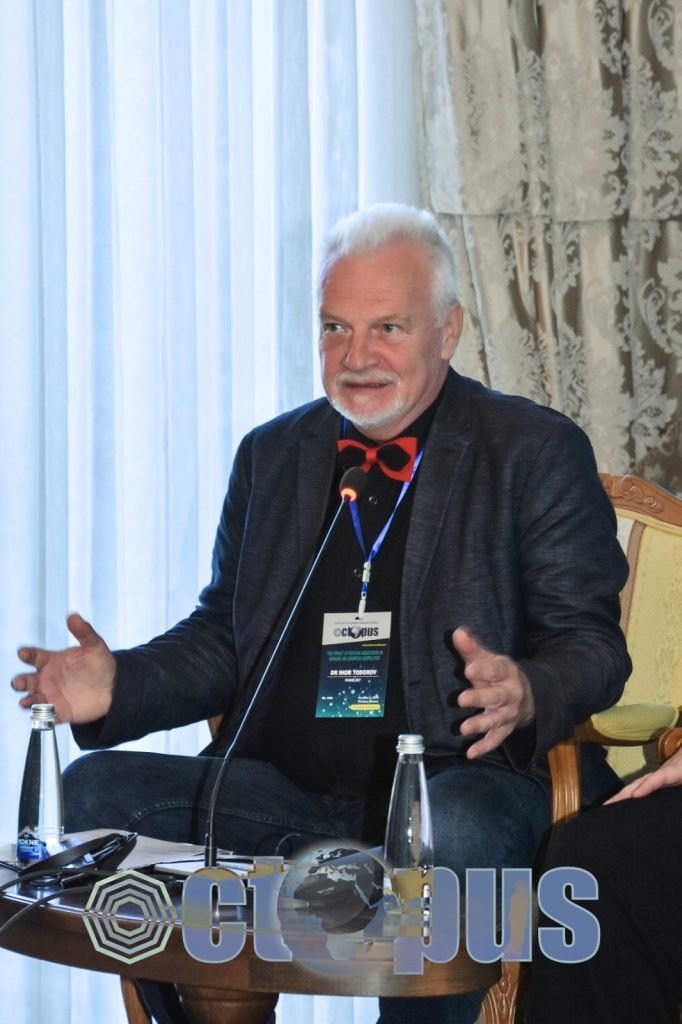
Todorov praised NATO for its significant role during the Cold War, where it successfully countered the Soviet Union’s influence. He acknowledged that NATO remains one of the most important security organizations in the world. However, he noted that NATO’s strategies have evolved since the end of the Cold War, with efforts to establish more collaborative relations with Russia. Unfortunately, these attempts have not always yielded positive results, particularly following Russia’s actions in the Balkans in the late 1990s.
Todorov critiqued NATO’s initial response to Russia’s aggression, pointing out the lack of a clear strategy during key summits, such as the 2008 Bucharest Summit. Although NATO supported Ukraine diplomatically and through various partnerships, it lacked concrete military support. This, according to Todorov, reflected NATO’s failure to fully anticipate Russia’s imperial ambitions.
Despite these shortcomings, Todorov recognized improvements in NATO’s posture since the invasion escalated in 2022. More member states, particularly after the invasion, committed to increasing defense spending, and the alliance expanded with the inclusion of Finland and Sweden, strengthening NATO’s geopolitical position.
Todorov argued that NATO needs to adopt a more assertive approach, moving beyond defense to take active measures against threats from Russia. He stressed that the Russian war against Ukraine has highlighted NATO’s importance in preserving European security and preventing further aggression.
He further argued that Ukraine’s potential membership in NATO would benefit the alliance, reinforcing its strength and contributing to regional security. He called on NATO members to unite in a shared goal of defeating Russia’s imperial ambitions, which he views as crucial to ensuring global stability.
Todorov concluded by emphasizing the need for a united victory between Ukraine and the West. Such a victory, he argued, would not only secure Ukraine’s future but also reshape the global geopolitical landscape by diminishing Russia’s influence. He expressed optimism that this victory could lead to further integration of Balkan states, such as Kosovo, into NATO, thereby consolidating European security against Russian aggression.
Pandeli Majko on the Ukraine War’s Ripple Effect: Rising Nationalism, Geopolitical Shifts, and Balkan Instability
Pandeli Majko, the former Prime Minister of Albania, addressed the geopolitical implications of the ongoing war in Ukraine and its profound effects on the Balkans. His speech highlighted how the conflict has reshaped regional politics, economy, and security while drawing parallels to historical events like the Yalta Conference and the collapse of the Soviet Union.
Majko stressed that the Russian invasion has fueled nationalist sentiments in the Balkans, increasing ethnic tensions and affecting political stability. He observed that the war has created uncertainty across multiple sectors, including energy security, as many Balkan countries rely on energy imports. This instability has forced regional nations to reassess their foreign policies and security strategies, drawing closer to the European Union and NATO.
The war has prompted Balkan countries to reevaluate their ties with Russia. Some have distanced themselves from Moscow, while others maintain close relations. Majko warned of increased disinformation and propaganda in the region, much of which originates from Russia and presents challenges for media and civil society.
Majko identified the war in Ukraine as a catalyst for renewed tensions between Kosovo and Serbia. He pointed out that Kosovo is unique in its involvement with the UN, the EU, and NATO, making it a hotspot for international diplomacy. He noted that Serbia continues to reject Kosovo’s independence, a stance that resonates with Russia’s justifications for its aggression in Ukraine.
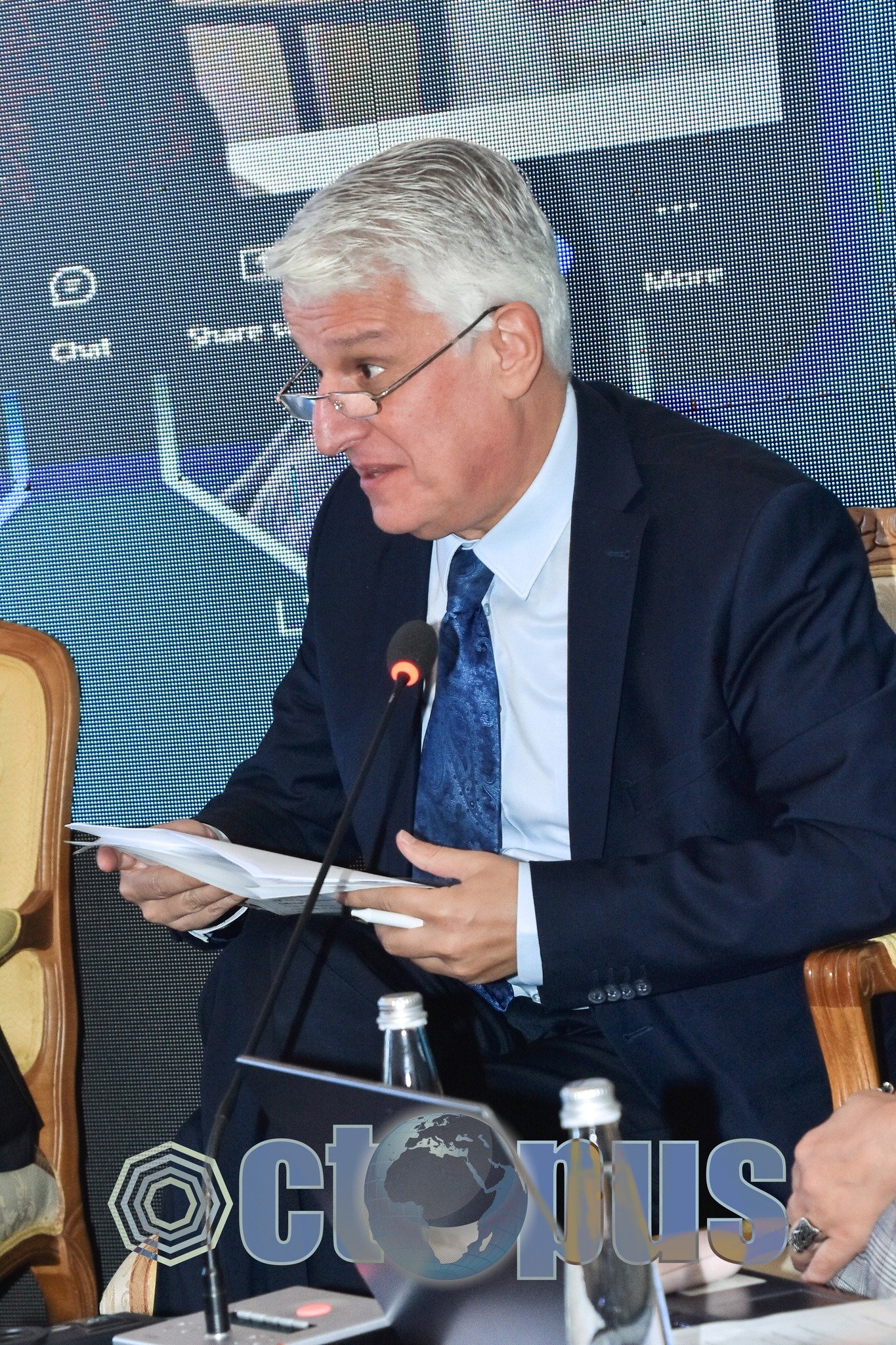
Majko criticized Serbia’s official rhetoric, which continues to reference NATO’s 1999 intervention as illegal—a stance Russia has used to legitimize its actions in Ukraine. He also highlighted unresolved Serbian military ambitions, including the failed operation in Banjska, Kosovo, which he described as an attempt to create a “Serbian Donbas” in the region. This operation, according to Majko, has led to increased nationalism and militarization in Serbia, which poses a risk not only to Kosovo but also to Serbia itself.
Majko expressed concern over Serbia’s decision to reintroduce mandatory military service, which he sees as a move toward further militarization. This decision could exacerbate tensions and create instability in the already volatile region.
Majko underscored how the Ukraine war has shattered the post-Cold War illusion of lasting peace. The conflict has awakened the world to the reality of power politics based on fear and hegemonic dominance. He invoked Dante Alighieri’s quote on neutrality in times of moral crisis, emphasizing that the war in Ukraine is not just a regional conflict, but a pivotal moment for humanity as a whole.
Majko concluded by stressing the need for coordinated efforts between Kosovo and its Western allies to prevent further escalation in the Balkans. He warned against turning Mitrovica into a “Berlin of the Cold War” and called for decisive action to safeguard peace and stability in the region.
Enver Hoxhaj warns of Serbian hegemony and regional instability amidst Western inaction and Russian influence in the Balkans
Meanwhile, Deputy Speaker of the Assembly of Kosovo Enver Hoxhaj, in his speech at the conference organized by “OCTOPUS,” highlighted a crucial point regarding the political situation in the Balkans. He noted that Russian aggression in Ukraine has sparked a resurgence of Serbian hegemony, making the region less stable. This is a serious concern, especially for countries that have endured painful experiences in the past.
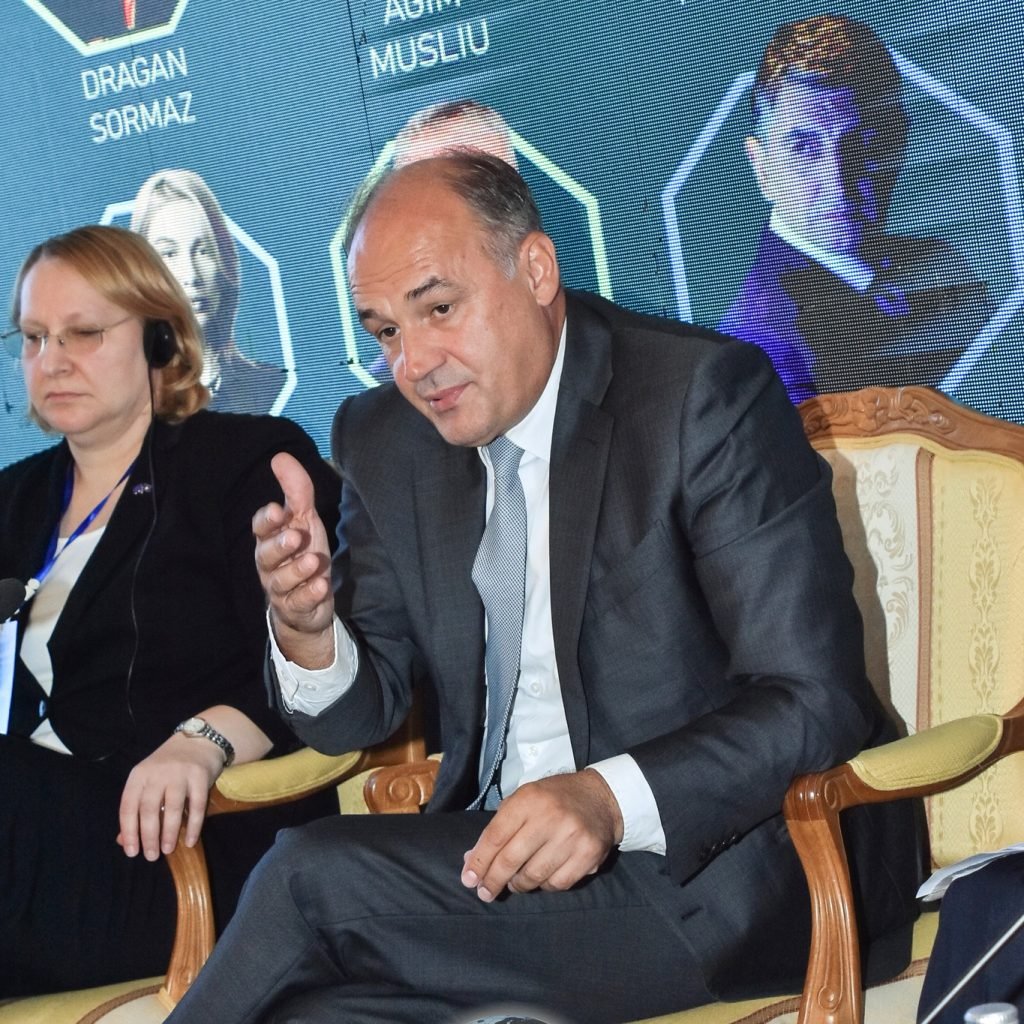
According to Hoxhaj, the lack of decisive action from the West has allowed Serbia to strengthen its aggressive behavior. This indicates that the approach of appeasement has not yielded positive results; on the contrary, it has contributed to further destabilization of the situation.
Mr. Hoxhaj noted that peace had been a norm in Europe, but the conflict in Ukraine and tensions in the Middle East have made war seem inevitable. He linked this situation to the insecurity and unpredictability of the modern age, viewing the war in Ukraine as a factor that has activated Serbia’s hegemonic ambitions in the Balkans. According to him, Serbia continues to challenge the sovereignty of Kosovo and other countries through destabilizing actions.
Hoxhaj criticized the Western policy for favoring the appeasement of Serbia, pointing out that this undermines regional stability. He emphasized that the lack of EU enlargement for the countries of the Balkans has created a security vacuum that allows Russia to exert significant influence in the region. Serbia, in his view, acts as a bastion of Russian influence, promoting anti-Western narratives.
The former minister stressed the need for regional cooperation and strong international support to safeguard sovereignty and stability in the Balkans. He also pointed out that the stalled European integration has caused disillusionment and emigration of youth to Western countries, making greater engagement necessary to support the statehood of Kosovo, as well as the independence of Montenegro and North Macedonia.
Austria’s Neutrality under Strain: Kati Schneeberger on Russian Influence and the Impact of the Ukraine War
Kati Schneeberger from “Vienna Goes Europe” spoke about the changing security dynamics in Austria and Europe due to Russia’s invasion of Ukraine. She focused on Austria’s neutrality, Russian influence, and how the geopolitical landscape is being reshaped, particularly within the European Union (EU) and NATO.
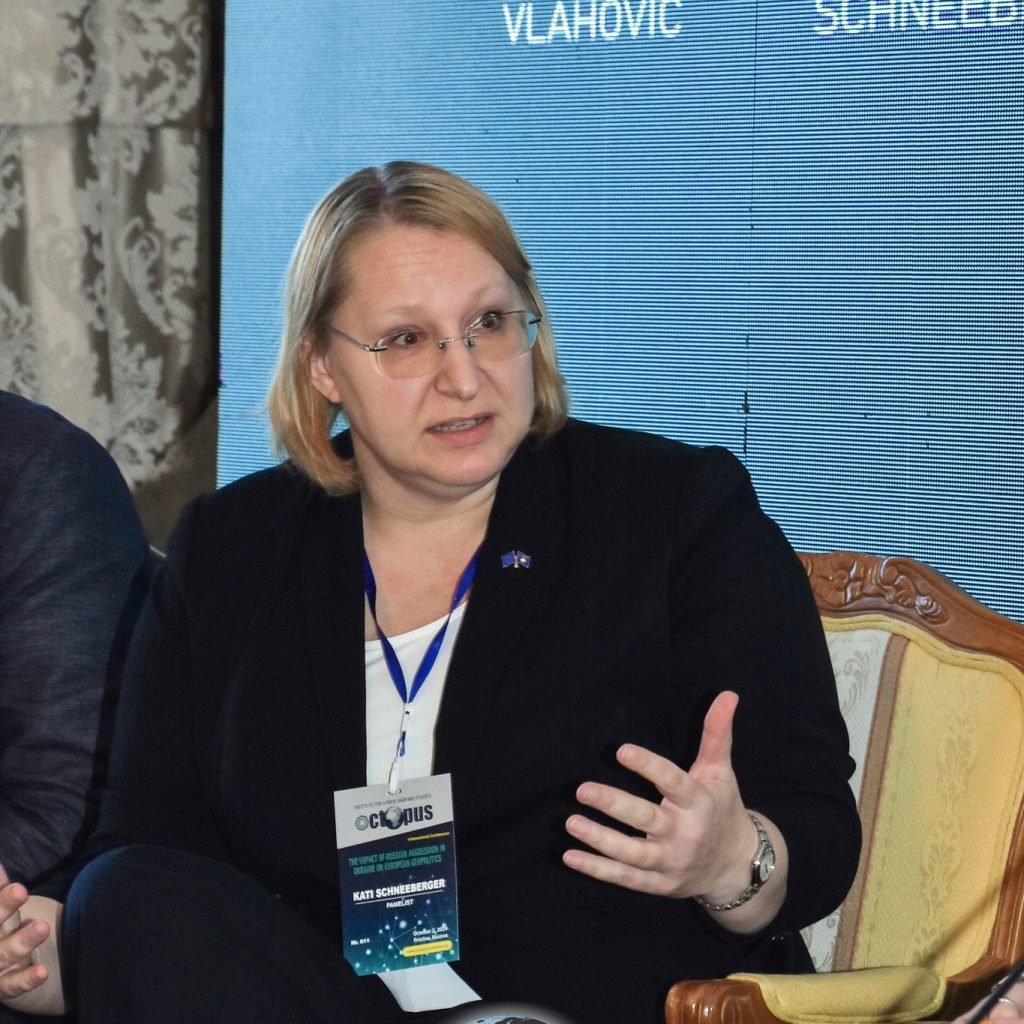
Schneeberger explained that Austria remains neutral, a deeply ingrained part of its national identity. After Russia’s full-scale invasion of Ukraine, Austrian leaders, including the Chancellor, reaffirmed the country’s neutral stance, refusing to discuss joining NATO. Despite not sharing a border with Russia, Austria is geographically close to the conflict, with Ukraine’s border nearer than Switzerland’s. This proximity raises concerns that if Ukraine falls, Russian forces could be on Austria’s doorstep, particularly through Serbia.
Schneeberger also highlighted Austria’s dependency on Russian gas (around 80%) and its continued financial ties to Russia, with large Austrian banks still operating in Russia despite the ongoing war. This economic connection creates challenges in imposing stricter sanctions on Russia.
In recent Austrian elections, the far-right Freedom Party emerged as the leading political force with nearly 30% of the vote. Schneeberger emphasized that this party has long-standing ties with Russia, having signed a friendship agreement with Putin’s party in 2016, two years after Russia’s annexation of Crimea. Russian influence is also seen within Austria’s intelligence services, with known Russian spy cells.
Russian narratives have penetrated Austrian politics, with both the far-right and parts of the Social Democratic Party echoing Russian sentiments. Schneeberger described how certain politicians from these parties oppose Ukraine’s NATO membership and criticize EU sanctions, favoring economic ties with Russia over security considerations.
Schneeberger noted that many Austrians misunderstand the country’s neutrality. The law defines neutrality with only three principles: no defense alliances, no foreign troops on Austrian soil, and the ability to defend the country independently. Despite this, public perception tends to view neutrality as extending to political non-alignment, a Cold War-era mindset that lingers in Austrian society.
Schneeberger argued that Austria’s neutrality, while historically significant, may no longer protect it in the modern geopolitical context, especially as Russian propaganda continues to shape political discourse. She raised concerns about Austria’s vulnerability due to its economic dependency on Russia and the influence of pro-Russian narratives within its political system. The speech underscored the need for Austria to reconsider its position in light of the ongoing conflict in Ukraine and the shifting security landscape in Europe.
Jayson Jay Smart on Russia’s Global Destabilization Strategy: Proxy Wars, Criminal Alliances, and Economic Crisis
Jayson Jay Smart, a national security adviser from the USA, shared insights into Russia’s evolving strategies in the global landscape. His speech focused on Russia’s use of proxies, alliances with criminal organizations, and how its actions undermine global security. Smart also discussed the economic pressures facing Russia due to sanctions and internal mismanagement.
Smart explained that Russia has shifted its tactics, using proxies such as Hezbollah, Hamas, and groups in the Balkans to create destabilizing events. This tactic aims to divert global attention away from Ukraine. Russia’s goal is to reduce the international community’s involvement in Ukraine by inciting conflicts and crises in other regions, which divides resources and focus.

A notable part of Russia’s global strategy involves working with criminal organizations and terrorist groups. According to Smart, Russia collaborates with these entities to continue its operations through black markets and shadow economies. This cooperation is particularly evident in regions like Latin America, where Russia’s intelligence network is active, and Iran is also involved in gold smuggling operations to fund groups like Hezbollah.
Smart emphasized Russia’s manipulation of international laws and norms, especially through its diplomatic channels, which it uses to spread disinformation and destabilize foreign countries. This strategy is prominent in Africa and Latin America, where Russian efforts, often through the Wagner Group, have been linked to regime changes and support for authoritarian leaders like Venezuela’s Maduro.
While projecting strength globally, Smart noted that Russia is grappling with significant economic problems at home. The country is facing housing market instability due to cheap mortgages, rising debt, and inflation. Smart warned that Russia could face hyperinflation within the next six months, which would severely impact its economy and potentially weaken its ability to sustain its international destabilization efforts.
Smart concluded that Russia’s long-term objective is not ideological but driven by self-preservation and the pursuit of gains for its elites. Despite Russia’s global destabilization efforts, he remains optimistic, citing the severe internal challenges Russia is facing as a result of sanctions and economic mismanagement. These factors could lead to significant changes in the near future.
Second panel: Authoritarian Regimes: A Threat to Balkan Stability and Peace
Dragan Šormaz Advocates for Serbia’s Western Integration: A Shift Away from Russian Influence
Dr. Dragan Šormaz, a former member of the National Assembly of Serbia, shared his perspective on the Russian invasion of Ukraine and its broader implications for Europe and the Balkans. His focus centered on the need for Serbia to align with Western values, NATO, and the European Union (EU), moving away from the influence of Russia.
Šormaz emphasized that Serbia’s future lies with Europe and the West, stressing the importance of integrating into the EU and aligning with NATO. He pointed out that Serbia has been historically tied to Russia, but this relationship no longer serves Serbia’s best interests. He argued that Serbia must recognize the geopolitical shifts caused by Russia’s invasion of Ukraine and take a more proactive stance in supporting European security.
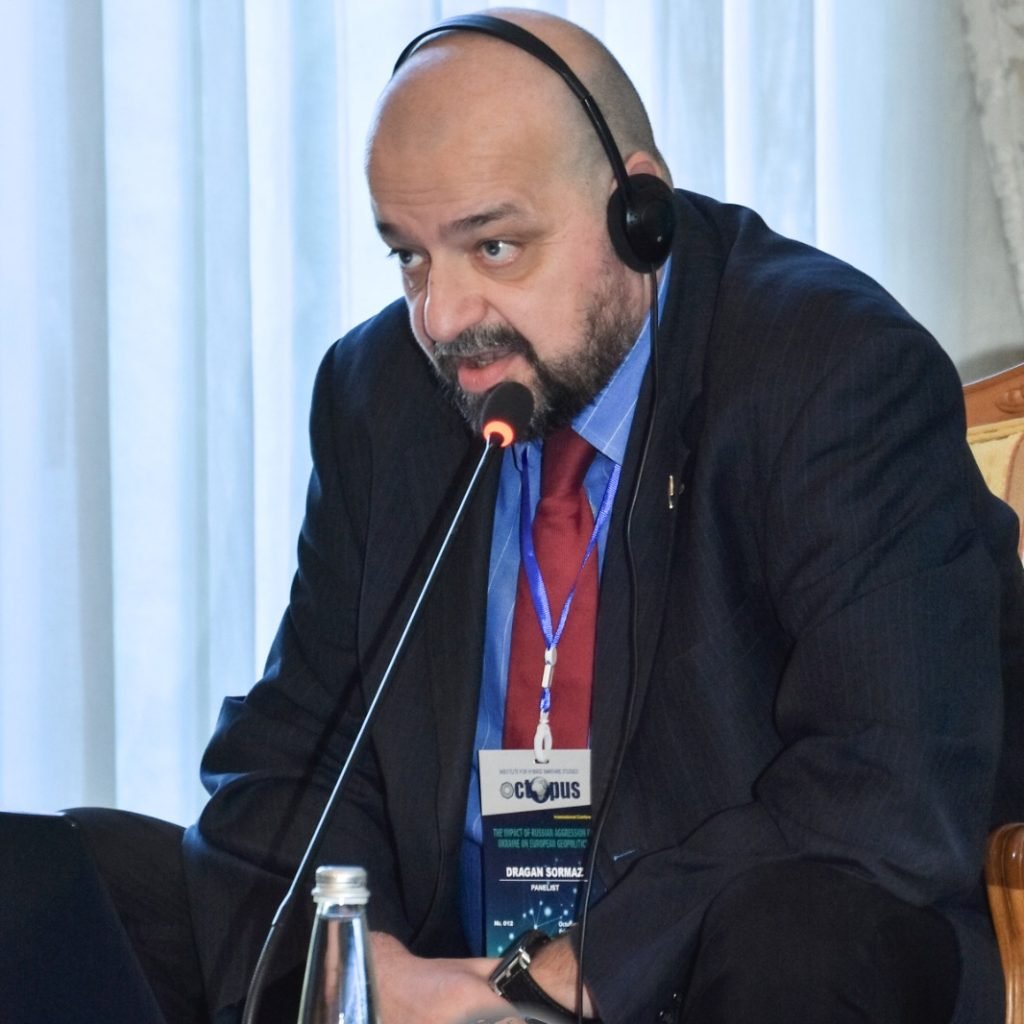
He highlighted NATO’s role in maintaining security and stability in Europe and the Balkans. Šormaz noted that the alliance is crucial for defending against aggressive actions like Russia’s in Ukraine. He advocated for Serbia to improve its cooperation with NATO, which he believes would strengthen the region’s security architecture.
Šormaz firmly rejected the notion that Serbia should continue to rely on Russia. He pointed out that Russia’s actions in Ukraine, including its illegal annexations and destabilization efforts, are direct threats to European security. He argued that Serbia should distance itself from Russia, as continuing to engage with Moscow could harm Serbia’s long-term goals of EU membership and economic development.
Šormaz closed his remarks by calling for stronger alignment with Western nations. He stressed that Serbia must stand with democratic values and institutions if it is to ensure its future prosperity and security. Serbia’s future, he argued, is inseparable from its integration into Europe and cooperation with NATO, and the country must avoid being drawn into Russia’s destabilizing influence.
Miodrag Vlahović on Montenegro’s Security Challenges: Russian Influence and the Need for Stronger Euro-Atlantic Integration
Miodrag Vlahović, the former Foreign Minister of Montenegro, discussed the effects of the Russian invasion of Ukraine on European security, the Balkans, and Montenegro in particular. His speech highlighted the challenges faced by smaller nations in the context of regional instability and Russian influence, with a particular focus on Montenegro’s security and political alignment with the West.
Vlahović emphasized that Russia’s invasion of Ukraine has further complicated the security landscape in the Balkans, exacerbating existing tensions. He warned that Russian influence in the region, particularly through proxies and disinformation campaigns, continues to pose a threat to the stability of countries like Montenegro. Vlahović pointed out that Montenegro, as a NATO member, must remain vigilant against these destabilizing forces.
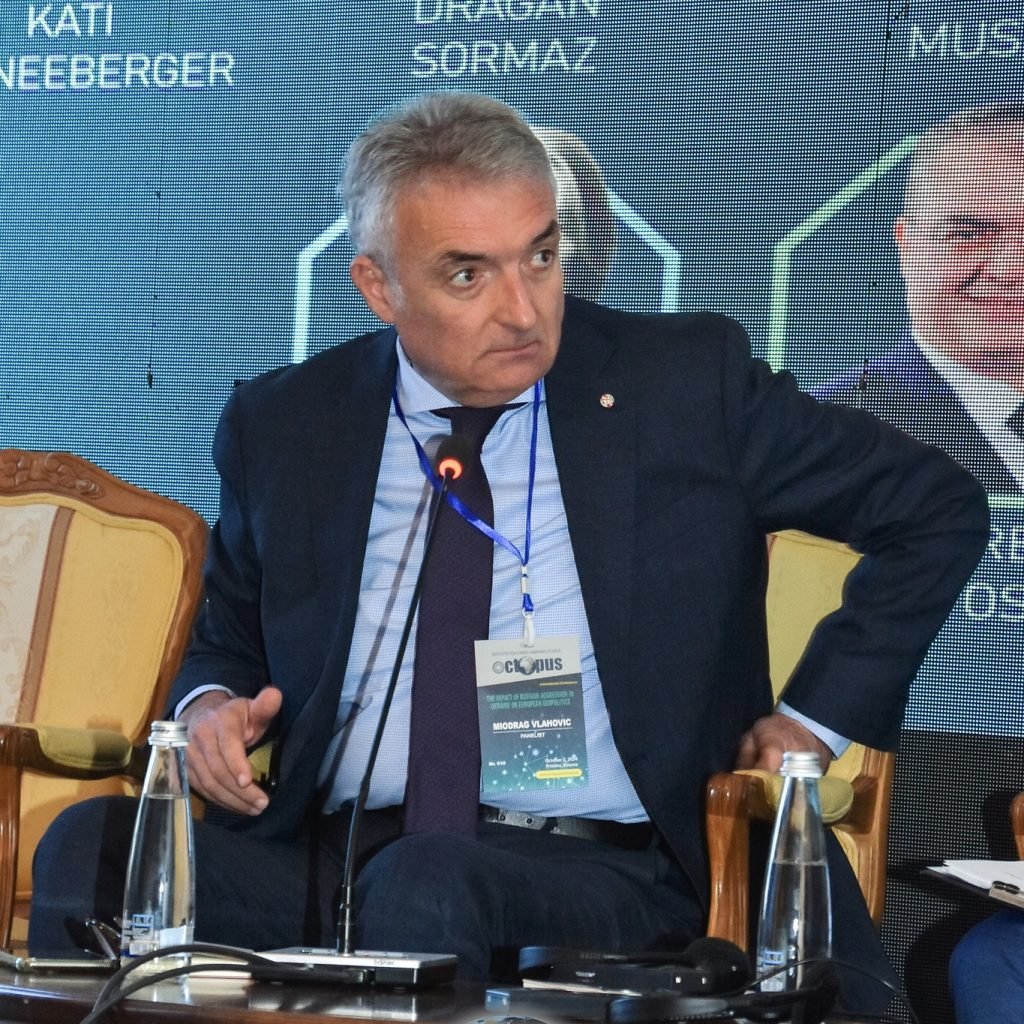
He reaffirmed Montenegro’s commitment to Euro-Atlantic integration, stressing that the country’s NATO membership is a cornerstone of its security policy. Vlahović argued that closer alignment with the European Union and NATO is essential to counteract Russian interference, which seeks to undermine democratic institutions in the region. He also noted that Russian disinformation and political meddling have targeted Montenegro in the past, including during elections and the 2016 coup attempt.
Vlahović criticized the slow pace of EU enlargement, which he believes has created a security vacuum in the Western Balkans. This vacuum allows for greater Russian and Chinese influence in the region. He urged the EU to accelerate the accession process for countries like Montenegro, arguing that their inclusion would strengthen the overall security of Europe and prevent foreign powers from exploiting vulnerabilities.
Vlahović concluded by calling for greater unity and support from Western allies to protect smaller countries like Montenegro from external threats. He argued that Montenegro’s path to stability and prosperity lies in deepening its ties with the EU and NATO while resisting Russian influence and interference. His speech underscored the need for a stronger, more united Europe to safeguard the region’s future.
Dr. Gurakuç Kuçi on Russia’s hybrid warfare in the Balkans: Media manipulation, elections, proxy actors, and geopolitical strategy
Dr. Gurakuç Kuçi, an expert in international relations and researcher at “OCTOPUS” Institute, provide a comprehensive analysis of Russia’s hybrid warfare strategies in the Western Balkans. His speech highlighted how Russia employs a combination of direct and indirect tactics, using state and non-state proxies to exert influence and destabilize the region. The ultimate goal of these strategies is to prevent Western Balkan countries from integrating with NATO and the European Union, thereby maintaining Russian geopolitical influence.
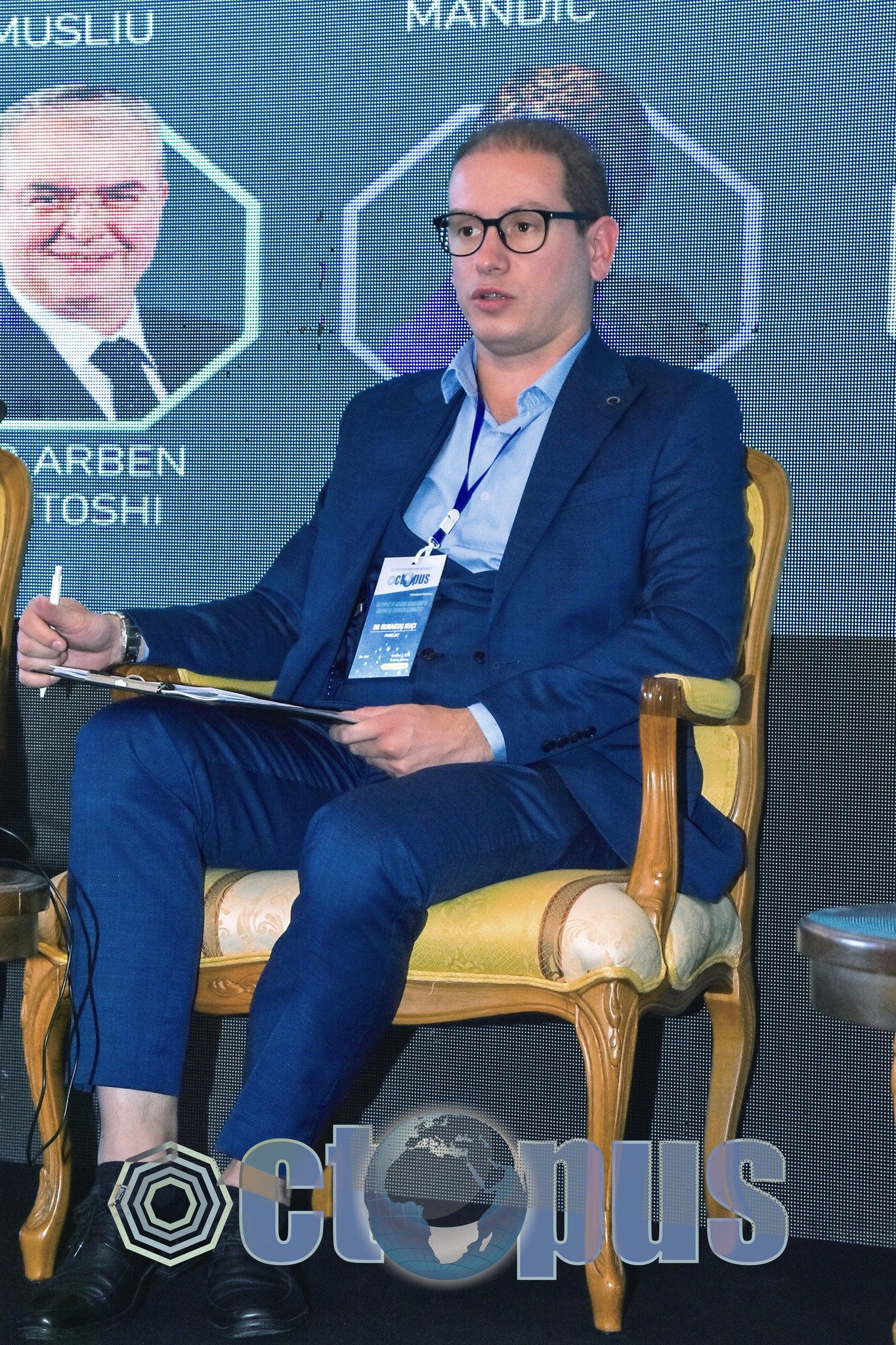
Kuçi provided historical background on Russia’s involvement in the Balkans, tracing its influence back to Tsarist times, with the aim of uniting Slavic peoples under Russian leadership. Even after the collapse of the Soviet Union, Russia has continued its efforts to exert control over the region. Vladimir Putin, driven by the belief that the Soviet Union’s dissolution was a major geopolitical catastrophe, aims to restore Russian influence, especially in the Balkans and Ukraine.
Kuçi outlined the two models Russia uses to exert influence: direct and indirect.
- Direct influence involves Russia’s direct engagement with key regional actors like Serbia and Republika Srpska.
- Indirect influence is exerted through non-state actors such as the Serbian Orthodox Church, media outlets, and various organizations.
He explained how Russia utilizes both state and non-state proxies to manipulate regional dynamics, creating further proxies and networks that destabilize the region.
One of the primary tools of Russia’s hybrid warfare is media manipulation. Russian-controlled outlets like Sputnik and Russia Today spread disinformation tailored to exacerbate ethnic tensions and historical grievances in the Balkans. This helps Russia influence public opinion and undermine trust in Western institutions like NATO and the EU.
Kuçi also highlighted the role of cyberattacks and electoral manipulation, with Russia interfering in elections across Montenegro and North Macedonia to support pro-Russian, anti-Western candidates. These tactics aim to destabilize political systems and maintain Russia’s influence over sympathetic leaders.
Kuçi emphasized that proxy actors are a cornerstone of Russia’s hybrid warfare strategy. On the state side, Serbia and Republika Srpska serve as critical allies in resisting Western influence in the Balkans. Russia capitalizes on historical and cultural ties with these entities to push its agenda. On the non-state side, the Serbian Orthodox Church, pro-Russian media, and civil society groups covertly promote Russian interests, shaping public opinion and maintaining a favorable environment for Russian intervention.
- Montenegro: Kuçi discussed Russia’s opposition to Montenegro’s NATO membership and its involvement in a 2016 coup attempt aimed at overthrowing the pro-Western government. Despite these efforts, Montenegro joined NATO in 2017, although Russia continues to influence political developments and elections in the country as now they control the most.
- North Macedonia: Russia attempted to block North Macedonia’s NATO accession by supporting anti-Western political movements and media outlets. While these efforts failed and North Macedonia joined NATO in 2020, Russia’s interference continues to pose a challenge as now they control the most.
Kuçi warned that Russia’s hybrid warfare in the Western Balkans is part of a broader strategy to challenge Western dominance and promote a multipolar world order. By destabilizing the region, Russia weakens NATO and the EU while consolidating its influence in this strategically important area.
Dr. Kuçi concluded by stressing that Russia’s hybrid warfare is effective because it exploits the region’s ethnic divisions, weak political institutions, and cultural ties to Russia. To counter this influence, he called for a coordinated Western response that strengthens democratic institutions, cybersecurity, and independent media in the Balkans. The stakes are high, as continued instability in the region could have far-reaching consequences for global security.
Third panel: Hybrid Warfare in the Balkans: Russian and Serbian Influence Tactics
Confronting the Past: Dr. Ivan Videnovic’s Apology for Serbian Crimes and Call for Reconciliation with the Albanian People
Dr. Ivan Videnovic starts by discussing the complex history of Serbian-Albanian relations, focusing on the tumultuous periods that have marked their shared history. He speaks on the political, social, and nationalistic tensions that have escalated into conflict over the years. The focus is on how these conflicts have shaped the identity and relations between the two groups, particularly during the wars of the 1990s and their aftermath.
He specifically addresses the atrocities committed by Serbian forces during the Kosovo War, acknowledging the severe human rights violations and war crimes that were carried out. Dr. Videnovic underscores that these actions were not isolated events but part of a systemic problem that led to widespread suffering and long-lasting trauma for the Albanian people.

In a particularly impactful part of his talk, Dr. Videnovic reflects on the need for personal and collective accountability. He argues that it is essential for Serbia, as a nation, to confront these past crimes honestly and openly. This, he states, is crucial for healing and for moving forward towards a peaceful coexistence with Kosovo and the Albanian people in general.
Toward the end of his address, Dr. Videnovic delivers a heartfelt apology to the Albanian people in his name and his 5000 voters. He explicitly apologizes for the crimes committed by Serbians during the conflict, recognizing the pain and suffering inflicted upon innocent civilians. He emphasizes that this apology is not merely a symbolic gesture but a necessary step in reconciliation and in fostering mutual respect and understanding between the two nations.
Dr. Videnovic concludes by calling for a continued dialogue and a sincere effort from both sides to build a future based on peace, justice, and human dignity. He stresses that true reconciliation can only come through acknowledgment of the past and a commitment to ensuring such atrocities never happen again.
Ivica Mandic Calls for Serbia-Kosovo Reconciliation and Joint NATO Path to Secure Balkan Peace
At a recent panel discussion, Ivica Mandic, a prominent military analyst from Croatia, delivered a compelling speech calling for the normalization of relations between Serbia and Kosovo, advocating for both nations to pursue joint NATO membership alongside Bosnia and Herzegovina. His remarks, addressed the legacies of conflict, the need for reconciliation, and the path forward for Serbia’s future in Europe.

Mandic emphasized that the full normalization between Serbia and Kosovo is critical for the stability of the region. He cited the Franco-German EU plan and Brussels agreements as frameworks for achieving peaceful coexistence. According to him, Serbia must formally recognize Kosovo as an independent country and work towards building strong, friendly relations, a departure from years of conflict and tension.
A major part of his proposal involved a joint application by Serbia, Kosovo, and Bosnia and Herzegovina to join NATO, which he argued would solidify their military cooperation and prevent future violence. While NATO membership would not resolve all political issues, Mandic believes it would guarantee peace by ensuring that disputes would be addressed diplomatically, not militarily.
Beyond political agreements, Mandic stressed the importance of cultural and historical reconciliation. He called for mutual respect between Serbia and Kosovo, particularly in honoring the victims of the conflicts on both sides. This, he believes, would help rebuild trust and create an environment where the two countries could work together as peaceful neighbors. He reflected on the historical ties between the nations and proposed that a shared memory culture could play a key role in healing the wounds of the past.
Mandic acknowledged that one of the major obstacles to this vision is the persistence of nationalist ideologies in Serbia, many of which are rooted in the policies of Slobodan Milošević. He noted that even though Serbia has undergone democratic transitions, certain political narratives tied to nationalism and expansionism remain powerful. According to Mandic, President Aleksandar Vučić represents a continuation of these outdated policies, and removing him from power would not be a sufficient solution.
However, Mandic was careful to distinguish between expansionist nationalism, which drives conflict, and defensive nationalism, which he said is necessary for protecting a country’s sovereignty. He argued that Serbia must move away from its current nationalist trajectory and adopt a more liberal, democratic framework, one that respects the borders of its neighbors and focuses on cooperation rather than conflict.
Despite these challenges, Mandic expressed optimism about Serbia’s future. He is confident that Serbia’s democratic potential is greater than many observers realize, particularly in its desire for closer ties with the European Union. While smaller political opposition parties may not yet have the strength to challenge the current government, Mandic believes that in time, democratic forces will prevail, leading Serbia towards a more progressive and cooperative future.
He emphasized that Vučić’s removal from power, while necessary, would not alone solve Serbia’s issues. The deeper problem, according to Mandic, lies in the continuation of nationalistic policies that prevent Serbia from fully embracing democratic reforms. His vision includes not only political change but also cultural transformation, where Serbia can develop as a modern European democracy.
Dr. Bleta Brovina on Propaganda Narratives: The Shared Challenges of Kosovo and Ukraine
Dr. Bleta Brovina, an expert in international studies from Kosovo, discussed the similarities and differences between the propaganda narratives used in Kosovo and Ukraine. Her analysis highlighted how Russia and Serbia deploy disinformation and historical revisionism to challenge the sovereignty of both Kosovo and Ukraine. Dr. Brovina also emphasized the importance of addressing these narratives to secure lasting peace and stability.

Brovina noted that both Russia and Serbia utilize fake narratives to legitimize their actions against Ukraine and Kosovo, respectively. These narratives are built around three main themes:
- Historical and National Identity Narratives – Both countries manipulate history to frame Kosovo and Ukraine as integral parts of their own territories.
- Victimization Narratives – Russia and Serbia present themselves as victims of Western expansionism, using this to justify their interventions.
- Legitimacy of Statehood – These countries question the legitimacy of Ukraine’s and Kosovo’s sovereignty, seeking to undermine their international recognition.
Dr. Brovina discussed how both Kosovo and Ukraine face continuous challenges to their sovereignty, despite having made significant progress in their international standing. While Kosovo’s war ended years ago, recent attacks remind the region that peace is fragile. Similarly, Ukraine faces an ongoing existential threat from Russia.
Brovina emphasized the need for open dialogue between nations, particularly between Kosovo, Serbia, and Ukraine, to challenge false narratives and promote peace. She posed the question: if leaders like Serbia’s Aleksandar Vučić were to step down, would a more democratic alternative emerge? Dr. Brovina expressed concerns that without significant ideological changes, even new leadership may continue to promote extreme nationalist narratives.
Dr. Brovina concluded by highlighting the need for long-term, cooperative efforts to confront disinformation and build a peaceful future. She advocated for continuous dialogue between Kosovo and Serbia and emphasized the importance of integrating broader international support to ensure the region’s stability.
Special Lecturer: Dr. Pekka Kallioniemi – Expert on Social Media and Disinformation, Finland
Dr. Pekka Kallioniemi on Russian Disinformation: Tactics, Global Reach, and the Role of Social Media
Dr. Pekka Kallioniemi, Finnish expert on social media and disinformation, discussed Russia’s extensive use of disinformation and propaganda on social media platforms. He outlined how Russia’s tactics aim to manipulate public opinion in the West, particularly in relation to its geopolitical goals.
Key Terminology and Concepts:
Dr. Kallioniemi emphasized the ongoing information war between Russia and the West. He explained that disinformation campaigns are a form of hybrid warfare designed to influence public opinion and polarize societies. These campaigns are long-term and often use multiple channels, primarily social media.
He distinguished between disinformation (intentional spreading of false information) and misinformation (unintentional spreading of false information). Disinformation often includes a mix of truth and lies, making it more difficult to detect.

Russian Disinformation Tactics:
1. Firehose of Falsehood:
Russia floods social media with a high volume of narratives across various platforms (Facebook, Instagram, Twitter/X). This overwhelming volume creates confusion, polarizes society, and diminishes trust in institutions. The tactic is not about convincing people but about creating distrust and disorientation.
2. Narrative Manipulation:
Russia uses sensational stories to distract or confuse public opinion. For example, it promotes various contradictory stories about incidents like the MH17 crash and the Nord Stream pipeline explosion. This leaves people unsure of what is true, leading to increased distrust of all information.
3. Troll Farms and Influence Campaigns:
Russia employs troll farms, which are groups of paid individuals who post and spread disinformation on social media. Before the 2020 U.S. presidential election, Russian troll farms reached around 140 million Americans per month on Facebook.
Global Reach of Russian Propaganda:
While most focus is on Russia’s influence in Europe and the U.S., Dr. Kallioniemi highlighted Russia’s significant disinformation efforts in Africa, South America, and the Global South. In these regions, Russian state media outlets like Sputnik and RT are some of the most popular news sources, often spreading anti-Western narratives.
Manipulating Social Media:
Kallioniemi provided examples of how easily social media platforms can be manipulated with money. For instance, buying likes, followers, or views is common, and this artificially inflated content can influence public perception. The size of social media engagement can make content seem more credible, even if it’s disinformation.

Case Study – Tenet Media:
He discussed a recent case where Russian state media, via shell companies, funneled millions of dollars to U.S. YouTubers to spread anti-Ukraine messages. Influencers were paid large sums (up to $400,000 a month) to produce videos promoting Russian propaganda.
The Role of Big Tech:
Dr. Kallioniemi emphasized how big tech companies, like those in Silicon Valley, possess vast amounts of data on users, which can be exploited for targeted disinformation campaigns. He noted how data collected by companies like TikTok and Facebook can be used to fine-tune algorithms to manipulate emotions and influence political choices.
Finland’s Response to Disinformation:
Finland has developed a robust response to Russian disinformation, focusing on media literacy, starting as early as preschool, where children are taught the importance of identifying falsehoods. Finland also emphasizes maintaining a free press and increasing trust in institutions. By fostering trust in society, Finland makes it harder for disinformation to take root.
The Changing Media Landscape:
Dr. Kallioniemi pointed out that younger generations are increasingly turning to platforms like TikTok for news, where content is often sensationalized and lacks depth. This shift to short-form content poses challenges to maintaining an informed public.
Artificial Intelligence and Deepfakes:
AI is becoming an increasingly significant tool in spreading disinformation. Russia is already using AI to create sophisticated disinformation campaigns. Deepfakes, which are digitally altered videos that can convincingly depict real people saying or doing things they never did, represent a growing threat to trust in media.
Dr. Kallioniemi concluded by warning of the dangers of a low-trust environment, which disinformation campaigns thrive on. He emphasized the need for societies to address these challenges by building resilience, enhancing media literacy, and ensuring the security of information.
Conclusions of Conference by PhD Cand. Agim Musliu, Director of Institute for Hybrid Warfare Studies “OCTOPUS”
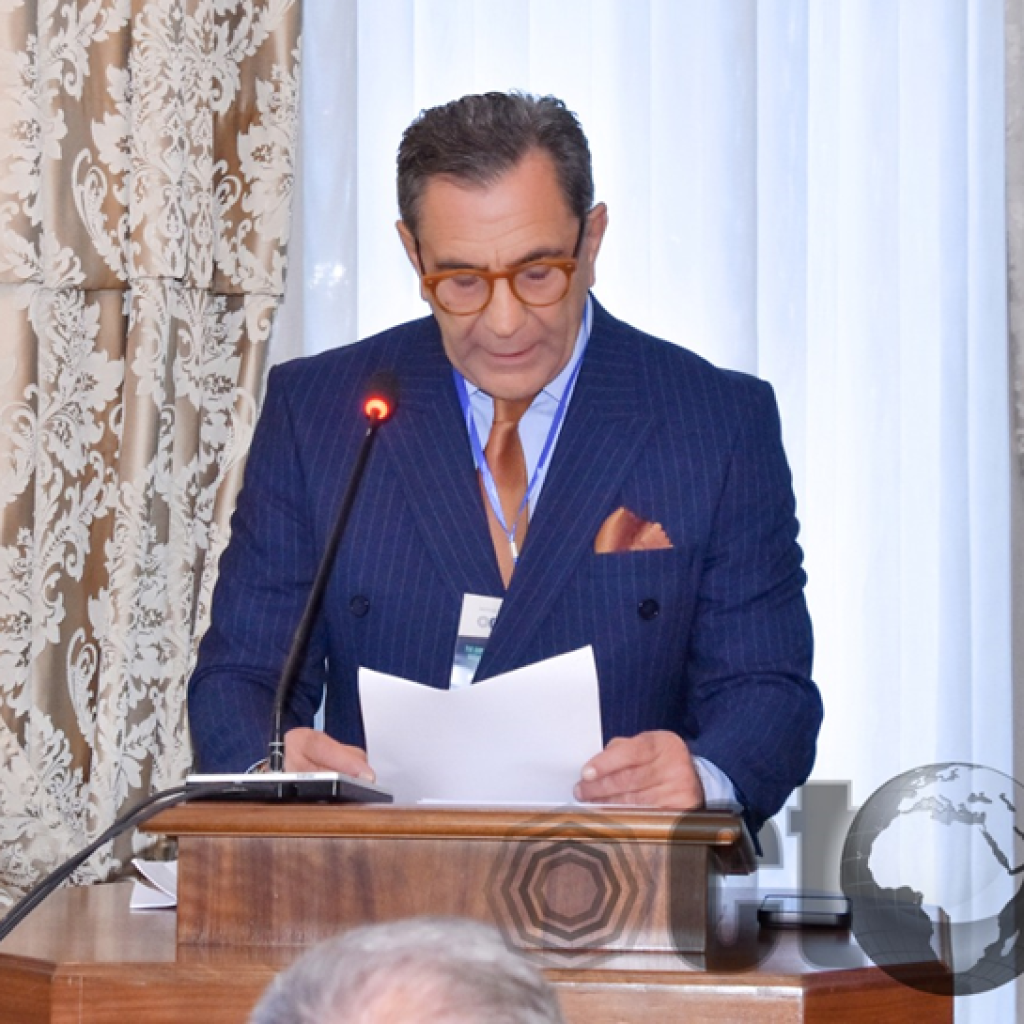
- Russia’s war to invade Ukraine has underscored the urgency for NATO and the European Union to take swift and concrete measures to strengthen unity in the fields of security and defense. This includes protecting geopolitical borders from external influences, both from conventional warfare, as exemplified in Ukraine, and through unconventional methods that threaten various parts of Europe.
- Russian aggression has intensified the use of hybrid strategies, including interference in the electoral processes of democratic nations, propaganda, and the spread of disinformation. These actions have created a destabilizing climate that demands a coordinated response from Western and pro-Western countries, reinforcing their capacities to defend sovereignty, national security, and peacekeeping efforts.
- Russia not only uses states as “proxies” to achieve its strategic goals but also supports non-state actors who present growing threats to international security. These actors pose an increasing challenge, necessitating a unified and decisive approach from the international community to stop them through strong and effective measures.
- Recent events have highlighted the necessity to draft and implement long-term security strategies, including economic, military, and technological support for countries facing destabilization risks from Russia and its allies. Such a comprehensive response is essential to preserving the stability and territorial integrity of Europe.
- Kosovo and other countries in the region that seek to maintain their European perspective must commit to upholding and strengthening democracy and sovereignty. Western countries, for their part, have an obligation, not only for the sake of their own security but also to support this geopolitical region in the Balkans and to put an end to Russian influence and its proxies.
Cite as: APA style: Musliu, A., Kuçi, G. (2024). Pristina: Global experts discuss the impact of Russian aggression on the stability of Europe and the Balkans. Octopus Journal: Hybrid Warfare & Strategic Conflicts, 3. https://doi.org/10.69921/83avdk94
(CC BY-NC 4.0) This article is licensed to you under a Creative Commons Attribution 4.0 International License. When you copy and redistribute this paper in full or in part, you need to provide proper attribution to it to ensure that others can later locate this work (and to ensure that others do not accuse you of plagiarism).

